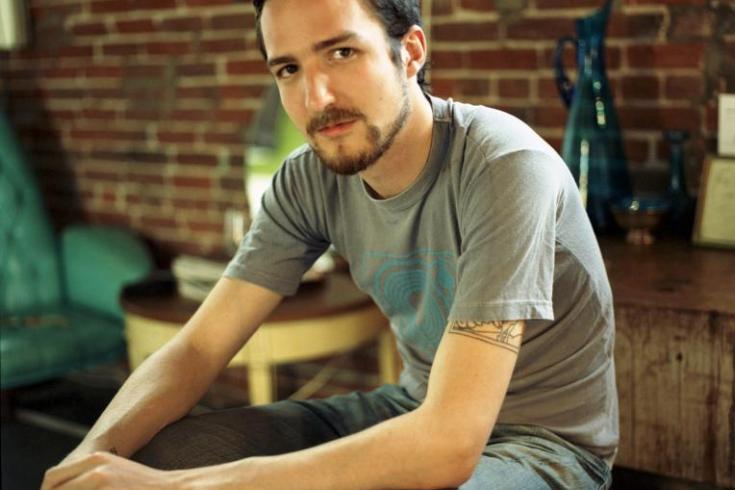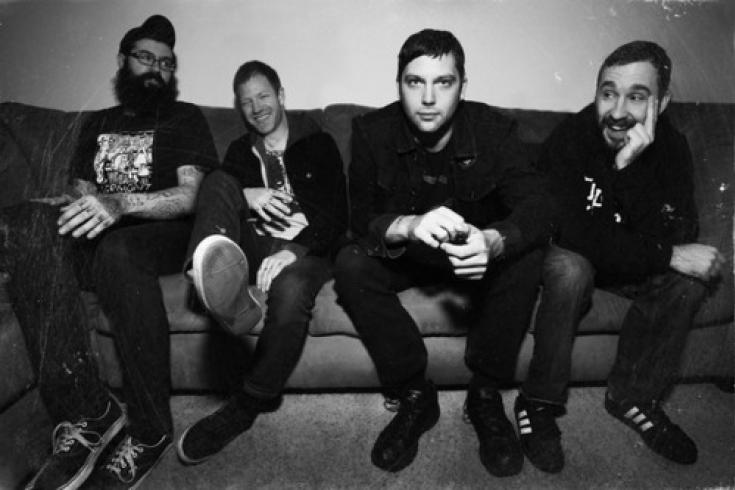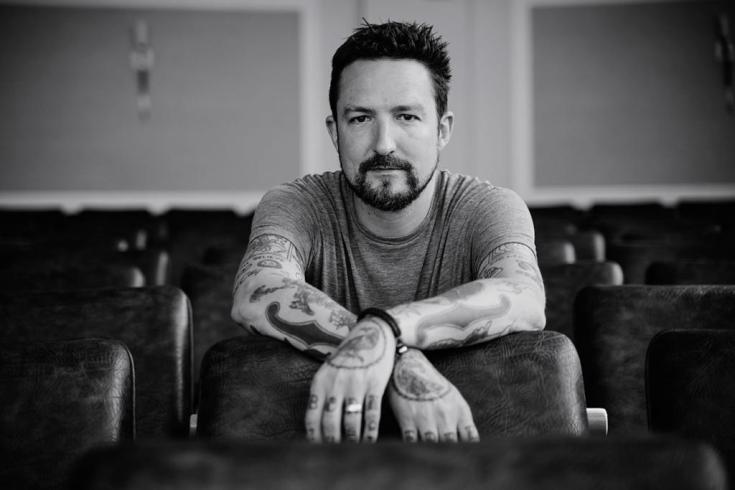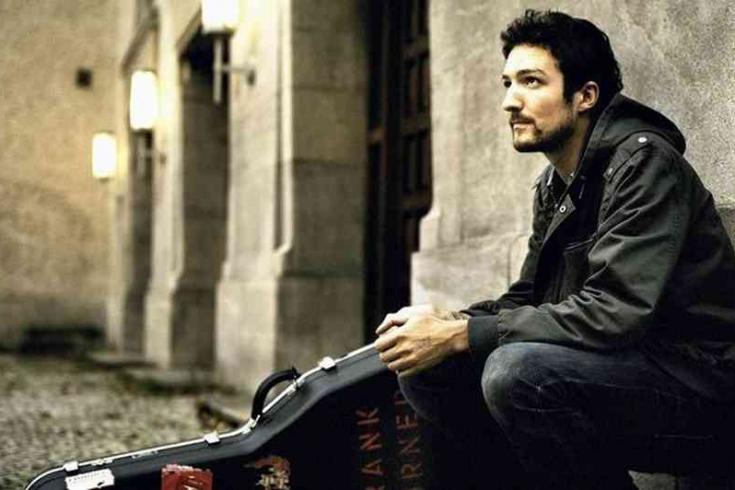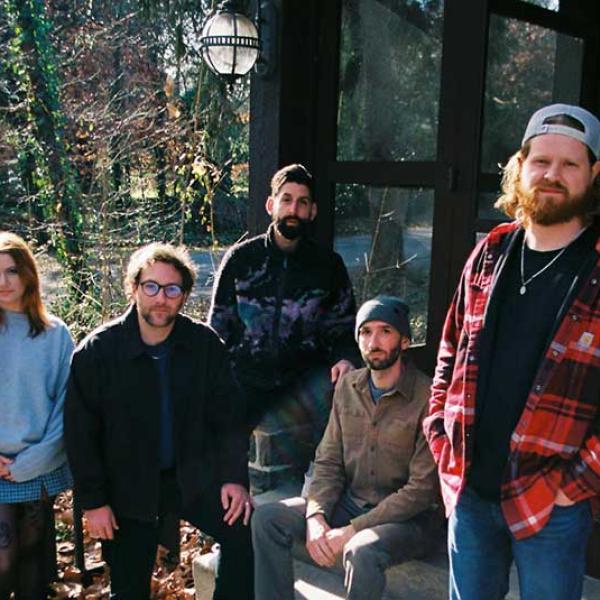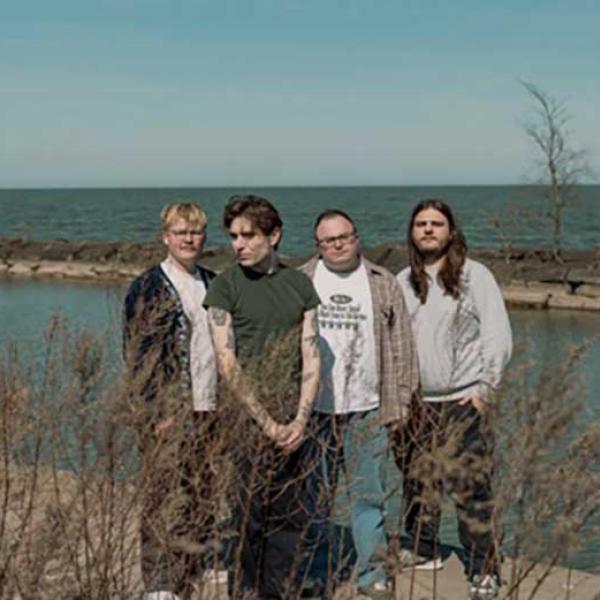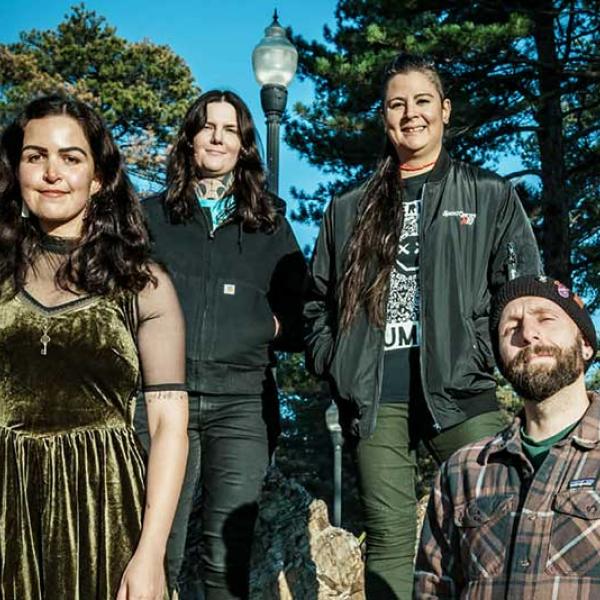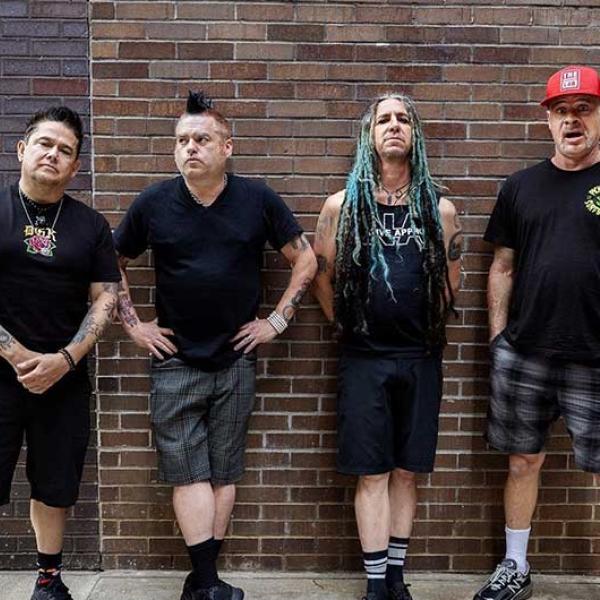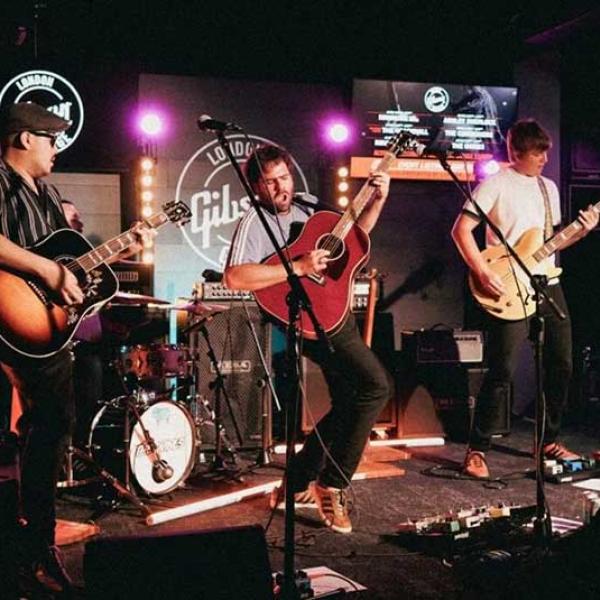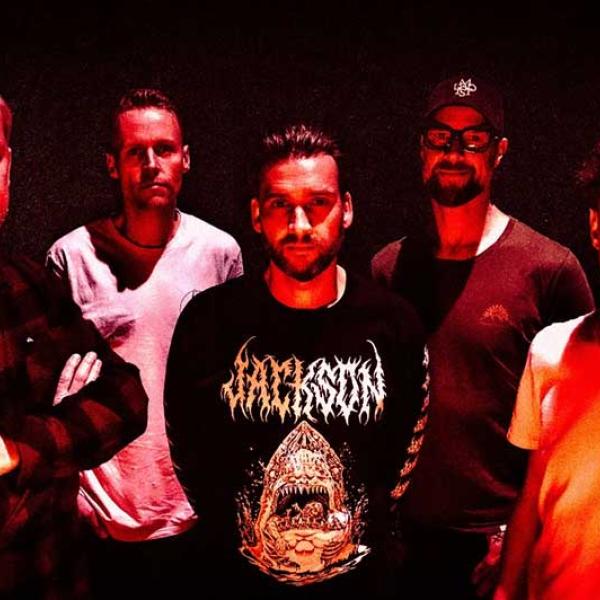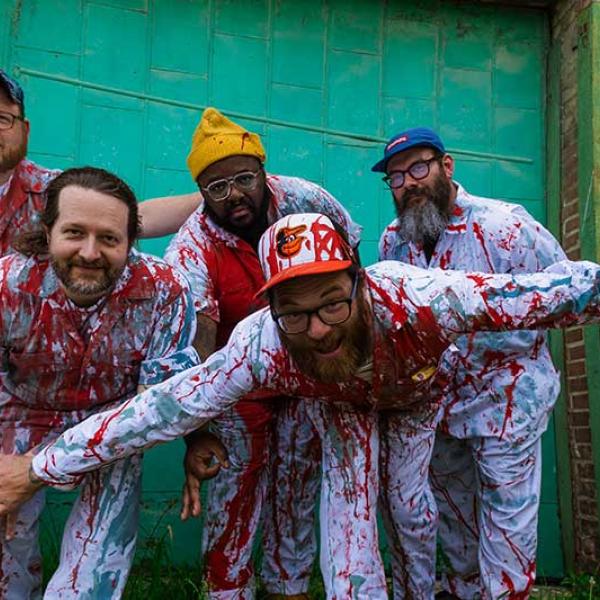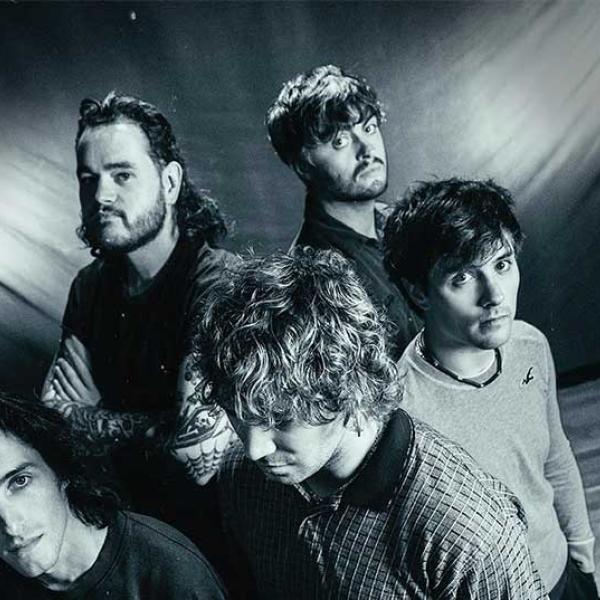Features
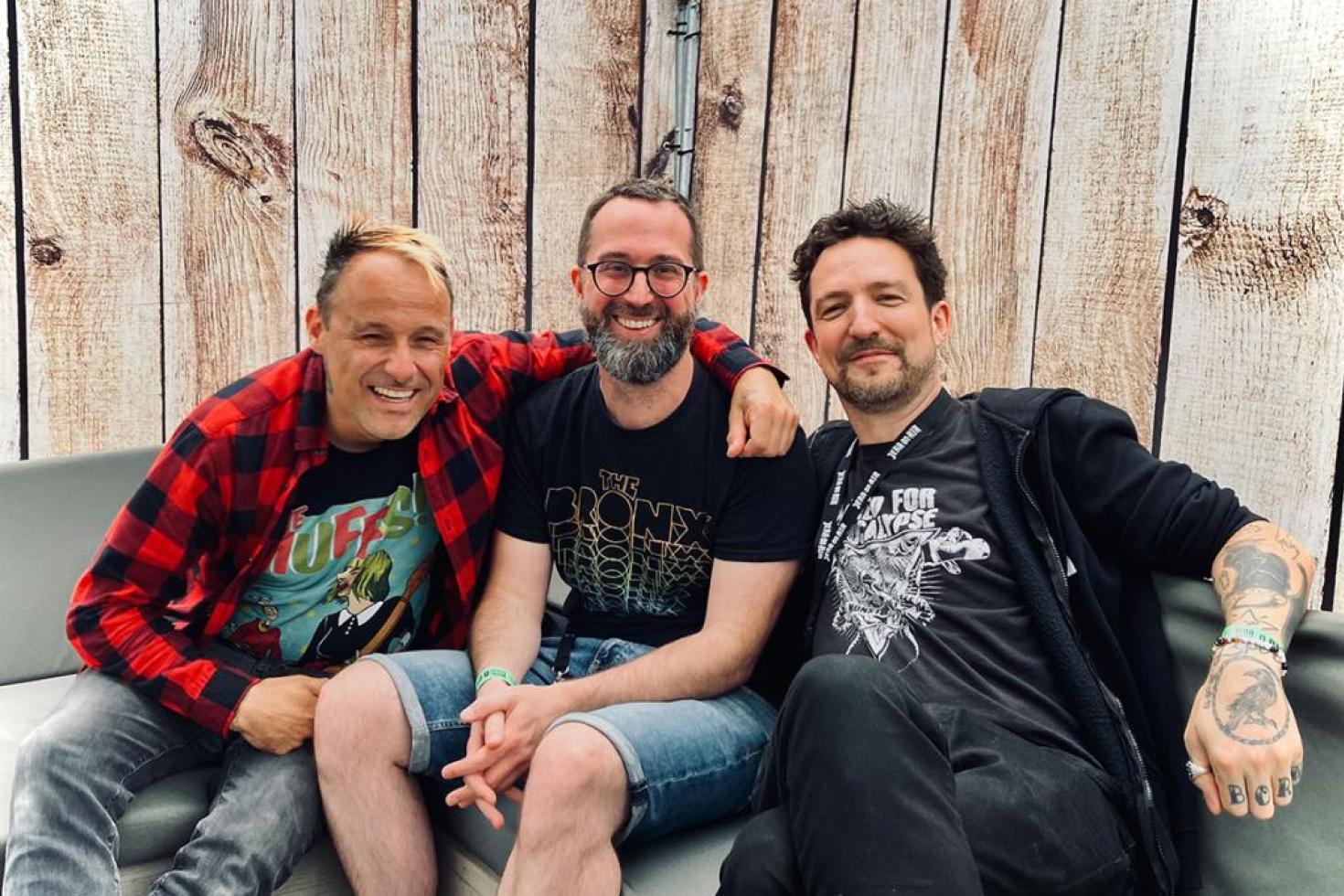
At last month’s Jera On Air festival, I got to sit down with Frank Turner and Ingo Knollmann from German punk rock legends Donots for a double interview. We talked about everything from acoustic albums and creative reinvention to the highs and lows of life on the road, the realities of major label deals, and what keeps them inspired after decades in the game. There’s laughter, honesty, a bit of chaos — and even some love for Frank’s cheekbones.
Frank recently dropped his first-ever live album, Show3000 Live, celebrating his 3000th show at the Alexandra Palace. Donots, on the other hand, are getting ready to release their acoustic album Schwert Aus Holz this September, boasting eleven reimagined fan favorites as well as two brand-new songs.
PRT: When did you guys first run into each other?
Ingo: A friend of ours who sets up shows in Germany knew of Million Dead before I did. And he told me to check this guy out because he used to be in a hardcore band and was now doing this acoustic thing. I thought it sounded really, really fucking cool. Next thing you know ‘Love Ire & Song’ blows up big time in the UK and that promo wave spilled into Germany.
And then in 2011 we were scheduled to play this festival together and before that I texted him like, ‘Hey, kind of a shot in the dark, but would you be interested in singing a song on our new record?’ And he got back to me in half an hour.
Frank: I knew Donots because I’d seen their name on festival posters. We have a lot of mutual friends, old punk bands and stuff that we've toured with together. So I knew who they were, but we'd never met. But I got the email and I immediately said yes.
Ingo: We hung out at that festival and got crazy drunk that night. Half a year later, Frank stopped by Münster for a show while we were in a studio there. I asked Frank if he wanted to do the song that day and he was like, ‘Sure, let me get a coffee and come pick me up.’
Frank: I remember waking up in the morning on my bus and a bunch of Germans pushed me into a car. I was a little bit worried that I was getting kidnapped. It was in the middle of fucking nowhere. But when we got to the studio, it was fun. The other thing I will always remember is that morning I'd written the song ‘Cowboy Chords’ while I was waiting to get picked up.
Ingo: Yeah, you tracked a demo for it after recording our song. We then took him back to the venue and watched him play an amazing show. Next thing you know, we hang out in London together to shoot the video, which was also the night that Tony Sly died.
Frank: And we've just hung out ever since. My favorite memory of you was the time I was DJ-ing in Cologne. I wasn't even playing a show. I flew out to do a DJ set, which is insane. Anyway, I called you and asked if you wanted to hang out. At first, you just wanted to have dinner together. So we had dinner and then Ingo said he’d walk me back to the club. Once we were at the club, he was like, ‘I'll hang around and have a couple of beers until you start DJ-ing.’ And towards the end of my set, he was doing the worm across the floor absolutely fucking wasted. And I was just like, ‘I guess you are going to hang out, motherfucker’ (laughs).
Ingo: We also did Lost Evenings. We were stand-in for some other band, I think?
Frank: Yeah, I hadn’t asked them to play Lost Evenings because I thought they were too big. They're a lot bigger than me in Germany. But then the singer from Turbostaat - the main support for the evening - fell ill and they had to cancel four days before the festival. We didn’t know what the fuck we were going to do. So then I just asked if Donots wanted to play and Ingo was like, ‘I can't believe you didn't ask us before.’ And they played the best show of the whole weekend. Me and my band were sitting in the wings just kind of going, ‘Ah, fuck, man.’ We felt murdered. Anyway, I would count us as good friends.
Ingo: This guy kills it every time we see him and he is just such an inspiration. Plus he's a good guy, just needs to shower a little more often. If this conversation continues, we're going to start kissing. (laughs) So let's do another question.
PRT: Frank, you went from Million Dead to playing solo shows and then playing with a full band. You had Mongol Horde as well. And Ingo, you went from singing in English to German, you had a solo project as well with Duchamp and you have an acoustic album coming up now. When you have been in music as long as you two have, do you want to mix things up just to stay inspired?
Frank: Yeah, I don't want to repeat myself. And the thing is I probably do sometimes, but I'm just trying not to. How many records have you done with Donots?
Ingo: 13 albums.
Frank: I've done 10, you've done 13. When you've done that many records, you don't want to just do the same thing over and over again. I already have a song like ‘Photosynthesis,’ which we still play every show. So when I'm writing a new record, I don't need to write a song like that because I've already got that one in the set list. Obviously you're trying to write good songs, but you mix it up. You don't want to say the same thing in the same way over and over again. There are one or two bands who can get away with that.
Ingo: That’s mostly the pioneer bands though, those that started a certain style. Bands like Bad Religion, the Ramones. You don't want them to sound any different.
Frank: Yeah. Or Pennywise. And I say that with respect. But I think for us, you want to try and push things forward. I know that I'm not fucking Radiohead. I'm not reinventing music, but there's a lot of different types of songs that I want to try.
PRT: Ingo, I already mentioned the acoustic album you have coming up. Was it hard to reconfigure your songs in an acoustic setting?
Ingo: Well, I wasn't very fond of the idea when it first came up. I mean, 95% of acoustic albums are basically bullshit. It's just bands unplugging their shit and playing the song exactly the same.
Frank: Have you ever seen the Korn MTV Unplugged? It's the fucking funniest thing you'll ever see in your life. And I quite like Korn, but that unplugged show is terrible. You're watching it and wondering who thought this was a good idea.
Ingo: I always thought they were your biggest influence? Anyway, most of those acoustic records are obsolete. Just fucking trash 'em straight away. There's no idea behind them, no new approach. So if we were going to do it, I wanted to change things up. Let's tear everything apart and come up with new arrangements, get people involved to do some guest vocals, play the piano. Just to make it different. The songs had to be at least on par with the original, if not better. And ultimately, I'm really happy the way it turned out and I love that record now. But at first, I didn’t want to do it.
PRT: Frank, when you start playing acoustic shows, was that daunting for you to face a crowd on your own?
Frank: Yes, it was. But that was kind of the idea. I had been playing in hardcore bands forever, but then I started hanging out at this bar where it was more country and folk music. It just seemed so naked to me, to get up there on your own with a guitar. I thought there was something really brave about it. I love hardcore music, but to a degree, if things go wrong, you just make loads of noise. There's all these kind of get out of jail free cards. But when it's just you and a guitar, you can't fuck up. It's a good song or it's a bad song. There's nothing to hide behind.
I really like Dillinger Escape Plan, but it's quite difficult to say if it's a good Dillinger Escape Plan or a bad Dillinger Escape Plan song. And with Million Dead, we use a lot of weird chords and stuff as well. So I decided I was going to play in 4/4 and use three chords and just try and say something that matters. I was terrified in the beginning, but that's kind of why I did it. I wanted to scare myself. But yeah, I think that - and this goes to your acoustic record as well - stripping things away is an interesting thing to do. To find what’s underneath.
Ingo: A good song is a song that works in pretty much every way you play it. There's a lot of bands out there with pyrotechnics and stuff. We don't use any of that. We love the punk approach and feel that if you need all those things to make your show work, then maybe your songs have a problem.
Frank: I couldn’t agree more. I’m not naming names, but we’ve toured with some very big bands, and honestly, my favorite part of their set is when they play a couple songs from the first two records in a super stripped-down way. Then the newer stuff comes in with the full light show, and it just feels like something got lost. Like you said, a good song is basically a diagram: a couple of chords, a melody, and words. You can dress it up as punk or disco or whatever, but the core of the song stays the same.
PRT: After all these years, what is it that you still get out of making music personally?
Frank: Oh, well, I mean, a bunch of stuff. First of all, I love it. It's how I express my feelings about the world. It's my job. It's the only thing I really know how to do well. One big thing for me is that when I think back to that bar I mentioned, there were so many great songwriters there. People talk about how you need a lot of luck in the music industry. And that’s true. I know a lot of people who, based on talent, deserve to be as successful as me, and they're not. We're still friends, and I feel like I have to keep doing this almost for them.
Ingo: That’s a beautiful thought.
Frank: My friend Adam's the best songwriter I know. He works in insurance now. It didn’t happen for him, and it fucking should have. We hang out all the time. He's not bitter, but I’m kind of bitter on his behalf. I’m like, Why the fuck aren’t you headlining Glastonbury, motherfucker? He’s still probably my biggest influence as a songwriter, and he hasn’t put out a record in 15 years. That’s crazy to me. But yeah, we're lucky to do what we do. It's not just luck; there's also hard work, practicing your craft, all that shit. But if you do get lucky, you should enjoy it.
Ingo: I couldn’t agree more. It’s the best way to waste your time and the best way to spend it. I love the naivete in that. I don’t want to be too professional. At some point, things just have to happen to you. Sure, you can force things to work, but there’s real beauty in those unpredictable moments. That’s what you chase in the studio, when you're writing something new and suddenly everyone’s like, holy shit, is this really us?
Frank: And you get even more of that live, because it’s different every day. Which is why I prefer touring to recording. It’s also why I don’t really believe in live albums… even though I’m putting one out next month. What’s magic about what we do is that there's one hour, with one group of people, in one place, for one performance. Some nights it’s the greatest thing ever. Some nights it’s a pile of shit. And if it is, you do it again the next day, and you do it better. But it’s like, if you were there, you were there. If you weren’t, you weren’t.
We’re like magicians, really. That’s what we do: we create moments where people lose themselves for a little while. And it only lasts as long as it lasts. When it ends, the spell breaks, people go get the train home or whatever, and we go back to a much less glamorous life than people imagine. You shower, climb into your tiny bunk on the tour bus…
But yeah, that’s the thing for me about touring. A lot of it sucks. You miss your friends, eat crap food, don’t sleep properly, all that bullshit. But then you get that one hour each day where you get to do something magical. And that’s enough to wash the rest of it away. It’s such a privilege to be able to get on stage and do this.
PRT: You have both been on the major labels. Ingo, you then started Solitary Man Records and Frank, you went back to Xtra Mile. Looking back, was that a worthwhile experience?
Ingo: I’m not one to look back in anger or hold grudges, because it was good when it happened and it was great, until it went down the drain. But it taught us lessons. Now we know much more about what we want and what we don’t, and that’s something valuable. Every stop on the road leads to where you are now and teaches you something. So in the beginning, it was good for us to get exposure, to have people helping. And when you start your own label, you’re in charge of everything, which is great, but your head’s in the noose financially. It’s a big risk. If it goes well, great. If it doesn’t, it’s worse.
Frank: I’d say the same. Life has phases, and at that point, it was a good thing. I was kind of glad it ended when it did. I don’t know how you feel about this, but when a major label is working right and when everyone cares, it’s impressive. It’s like a fucking tank. It drives through a crowd, and it’s cool if you’re on the back of it… not in the crowd. But the problem - and this is everyone’s experience - is that unless you sell a million copies of your second record, they lose interest. And by the third one, they’re barely around.
Ingo: There's also a lot of fluctuation. People leave the label, someone new comes in. And all of a sudden, the guy that got you there in the first place, isn't there anymore and nobody's really looking after you.
Frank: The first album I did with a major label was Tape Deck Heart. It was incredible. Seeing us hit number one on American radio, I was like, what the fuck? That had never happened to me before, or since. And to this day, a lot of people in the US know who I am because of that, and I’m grateful. But they didn’t do that for the next four records… so we left.
PRT: Ingo, when you decided to sing in German, was that a tough decision to make?
Frank: Well, he'd already been using Duolingo for a while and his German was getting really good!
Ingo: Fuck off (laughs). In the 31 years we’ve been together, we’ve been signed to various labels, all of which, at some point, suggested we try something in German. Usually when another German-singing band was blowing up. But it never felt right. Then we were on tour in the States with Flogging Molly, and we couldn’t believe it. Every person in the crowd, 6 to 8,000 a night, singing every single syllable. Not just the choruses, everything.
That kind of inspired us to give it a try. The idea was: if it worked, we could say it was our plan all along. If it didn’t, no one would know because we’d bury the recordings deep in the ground.
I sat down and listened to all my favorite German-sung punk records from back in the day. But I also listened to German radio, which is terrible. You wouldn’t believe how bad German pop music is. The worst. But I wanted to figure out what I wanted and what I didn’t, and somewhere in between was the voice we were looking for.
And it worked. Things have blown up for us ever since. I’m just glad we decided to go for it.
PRT: But don’t you kind of limit yourself to playing mostly in German-speaking countries because of it?
Ingo:Obviously it's a lot easier if you sing in German and you play in German-speaking countries like Austria. But we also played in Japan or Spain. And it works out if you sing in German as well. I mean, music translates, attitude translates.
PRT: Both of you have been kind enough to do a feature for my website where you rank your own albums. Do you have a favorite album by one another?
Frank: Oh, definitely the one I'm on. ‘Wake The Dogs’. Or the new one. No wait, the next one!
Ingo: The first album you listen to by an artist is always something special. So I hold ‘Love Ire & Song’ in high regard, along with every new record that Frank releases. But those first albums you hear resonate differently. The first album you hear by Descendents, it's that record forever.
Frank: One of my theories about Death Cab for Cutie is that all their records are the same. And everybody's favorite Death Cab record is the first one they heard. So for me, it's ‘Transatlantic.’ And for other people, it's another one. But actually on their own, they are kind of the same.
PRT: I can imagine that when you first said you were going to play acoustic, people were surprised?
Frank: A lot of people thought I was having a mental health episode. It’s funny, because I’ve never claimed to be any kind of trailblazer. For starters, I already lost that to Chuck Ragan. And with Million Dead, we toured with Jonah Matranga, who was already doing solo stuff. I didn’t realize it at the time, but that definitely influenced me.
In 2005, the path from punk band to acoustic record wasn’t really a thing. So when I said I was going to do it, a lot of my friends were like, Are you okay? At the time, I thought I had a plan and everyone else thought I was crazy. Now, looking back, everyone thinks I had a plan—and I think I must’ve been crazy.
What I’m proud of is that it didn’t make any sense. I got offers to join other bands or start something new, and that would’ve been easier. But I never seriously considered it. I look back at that kid from 20 years ago and I’m kind of impressed. I just followed my art in a way that still feels pure. And I’m like, Good for you, kid.
PRT: Have you ever had a piece of advice career wise that you completely ignored and were better off for it?
Frank: Yeah, but never from anyone I respected. I’ve had people tell me I needed to focus on my branding, and I’m like, go fuck yourself—I’m not a fucking T-shirt. Or I've had people tell me to work with songwriters.
Ingo: We learned we need to care less when it comes to songwriting. Back in the day, we limited ourselves to a certain style because we thought that’s what we had to sound like. When we started working with J Dilla as a producer, he sat us down and told us we were a great live band, but that our records were garbage.
He told us to loosen up. Stop overthinking pre-production, go into the studio, and just let shit flow. And ever since, our songwriting has gotten better. We don’t show up with finished songs anymore, just ideas. We write together. In the morning, you have no idea what you’ll have recorded by night. And there’s magic in that. It’s also a risk. Some days are total bullshit, nothing happens. But other days? Pure magic. Something happens you never saw coming.
PRT: Do you work the same way?
Frank: I've done some records that way. I produced ‘Undefeated’ myself, and I fucking knew exactly how those songs went before we started rehearsing them. The actual recording of that was just getting down good performances of the parts. But with ‘Be More Kind’, I had no idea what that record was going to be like. I just went to the studio with a ‘let's see what happens’ kind of attitude. And I think both approaches are valid.
PRT: Has there ever been a moment in your career where you were like, fuck it, I'm going to walk away from this.
Frank: I had a moment after my first album, Sleep Is For The Week. We toured when it came out and did maybe 300 tickets a night. Six months later, we toured again and did 150. It really felt like no one cared anymore. I thought my moment had passed. Nobody in the industry seemed excited about me or what I was doing.
All I had were the songs. And I felt like I was writing better ones, but I definitely had that fear of becoming the guy who overstays his welcome at the party. Like, it’s 2 a.m., man—go home. I started thinking, maybe that was it. Maybe I made my record… and now it’s time to get a job or whatever.
I’ve also had moments where the internet’s been unkind to me, and it’s a tough thing to talk about. You’re supposed to be tough, be cool, but it’s fucking horrible. And if you’ve never been on the receiving end, you don’t know what it feels like.
Like, I poured my heart and soul into No Man’s Land, yet certain people just decided to attack me over it. I felt like I’d completely wasted my time. I honestly didn’t want to get on stage anymore.
Thankfully, my band were amazing. Really supportive. We kept playing, and people kept showing up. That got me through it. But yeah, I think it’d be crazy to do this for as long as I have and not have moments where you think, Maybe there’s another way to live.
Ingo: But then again, every day is just so beautiful that you're grateful for what you get to do.
Frank: Fucking hippie.
Ingo: Of course there's always bullshit days. But like I said before, we're privileged fucks.
Frank: Exactly. I think we have fewer bad days and they're not that bad.
Ingo: Bad days can teach you something, and then that maybe inspires you to write a song about it. For us, there was really just one moment like that, back when we did our last record with Sony/BMG. We had to get lawyers involved to get out of the deal, and it took two years. The Sony lawyers were basically like, Who the fuck are you guys? And just let us bleed.
During that time, we thought, If there’s even the slightest chance we have to stay with them, let’s not make any more records. Maybe just play live, whatever. But no more releases.
By the time we finally got out of the deal, we celebrated harder than when we first signed it. Which kind of says it all.
PRT: If music was to somehow completely disappear tomorrow, what would replace that for you?
Frank: There's nothing like it in my experience. I know other people get fulfillment in different ways. Art or football or whatever. I would find something else to do with my life, but nothing would replace it.
Ingo: I'd say Frank's cheekbones. If you look at them in the right light… there’s just something about them. I could look at them for hours on end.
PRT: What does success look like for you now compared to when you started out?
Ingo: I’ll go with the hippie answer again. Success, to me, is being able to do this for 30+ years. I get to live the best life. I get to be with my family, I get to do this, and it doesn’t even feel like a job - which is amazing. I hang out with great people, meet new ones, travel… it’s everything I ever wanted.
Sales matter of course, especially when you run your own label and have to make ends meet. But I can’t complain. If there are 20 people in the tent this afternoon and they’re having a good time, then I’ve already won.
Frank: You'd be lucky to have 20 people! At the beginning, there were some basic principles: I wanted to write good songs, play good shows and I didn’t want to have another job. And those two things are still true.
There was a point in my career where I was kind of tiptoeing around the edge of the mainstream. There’s a siren call there, you know? You start wondering, What would it be like if I was fucking Ed Sheeran or something? But honestly, I’m kind of glad I’m not.
I’m sure he lives a perfectly happy life, but I’m not sure that’s for me. At this point, though, something interesting happens. I’ve been doing this for 20 years - you’ve been at it for 31 - and there’s a moment where you go, Fucking hell, I’m still standing. I’m still here. And that’s rare.
Sometimes I look at old show bills from 2006 or whatever, and all these bands that were way bigger than me, they’re gone. And I’m still fucking here. That’s kind of cool, and I’m proud of that. It becomes its own kind of justification, its own weight.
Think about how many 16-year-olds dream of being in a successful band. How many are still in one at 43, and have been doing it since they were kids? Not many. So yeah—fuck you all, I did it. And sure, there’s luck involved, but also skill, hard work, and everything else.
And I want to keep doing this as long as I want to, which is probably forever. That’s what success means to me.
Ingo: I don't even know how you pull it off. One of these days, I'll find out you're a fucking android. Earlier this morning, he told me he already has plans for next year. And I'm like, Fuck you. I don't have any plans for next week.
PRT: When you've played as many shows as you have, are there things that can still surprise you or throw you off?
Ingo: I’d say these days we’re chasing those moments. We try to create them and live in them. I don’t know about you, but I think you’d agree: when you have a favorite band and see them live, you always love it. But the bands that go the extra mile, those are the ones that really amaze you.
Bands who understand that you can’t just roll out the same show every night. You’ve got to make decisions, take risks, mix things up. The best parts of shows are often the accidents, like when your gear goes up in flames. Most bands are terrified of that stuff. We want it. That’s what we’re always looking for, those unpredictable, real moments.
Frank: The whole point of a show is communication. It's a dialogue, not a monologue. Or at least that's what I think it should be. If it doesn't make any difference to you what the audience is like, you're not doing it right. The whole fucking point is you're exchanging energy. So when something weird happens, like when somebody is crowdsurfing in a wheelchair, that’s cool. Or even if it’s just people holding up a sign with a request on it. Fuck yeah, I'll play that song. Just the moments that take you out of autopilot.
PRT: Is it easy to go in autopilot mode while you're playing a show?
Frank: Definitely! There's different levels to what you're doing on a stage, but some of it is just technical. Like trying to remember what the next chord is, what the next line is, trying to not fall. So there are some functional parts to it, but - and this is the part that no musician wants to admit but it's fucking true - there are days when I'm playing and I'm like, I need to do laundry in the next 48 hours.
You have moments onstage where your mind wanders. You try and avoid those moments. You want to be dialed in. But if you do it every day for 21 years, it’s bound to happen. And I don't want to try and make excuses, but if it's a shit crowd you do slightly go through the motions. We had a show the other day - I'm not going to say where it was - where the audience didn't seem that bothered that we were there. Everyone has those shows. But you do the best you can because the whole point is being connected.
Ingo: And also, when can I do laundry? That's really the essential question of touring.


